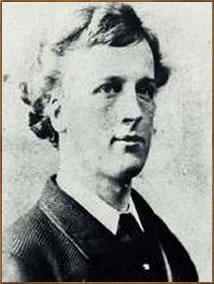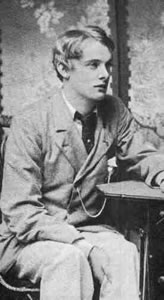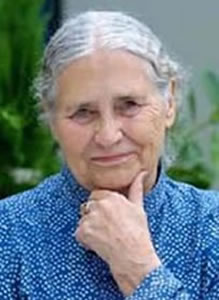De Engelse dichter en schrijver Alfred Douglas werd geboren in Ham Hill in Worcestershire op 22 oktober 1870. Zie ook mijn blog van 23 oktober 2006 en ook mijn blog van 22 oktober 2007.
LONDON
SEE what a mass of gems the city wears
Upon her broad live bosom! row on row
Rubies and emeralds and amethysts glow.
See! that huge circle, like a necklace, stares
With thousands of bold eyes to heaven, and dares
The golden stars to dim the lamps below,
And in the mirror of the mire I know
The moon has left her image unawares.
That’s the great town at night: I see her breasts,
Prick’d out with lamps they stand like huge black towers,
I think they move! I hear her panting breath.
And that’s her head where the tiara rests.
And in her brain, through lanes as dark as death,
Men creep like thoughts . . . The lamps are like pale flowers.

Alfred Douglas (22 oktober 1870 – 20 maart 1945)
De Britse schrijster Doris Lessing werd geboren in Kermanshah, Perzië op 22 oktober 1919. Zie ook mijn blog van 11 oktober 2007 en mijn blog van 22 oktober 2006 en ook mijn blog van 22 oktober 2007.
Uit: Alfred & Emily
„The suns of the long summers at the beginning of the last century promised only peace and plenty, not to mention prosperity and happiness. No
one remembered anything like those summer days when the sun always shone. A thousand memoirs and novels averred that this was so, and that is why I may confidently assert that on that Saturday afternoon in August 1902, in the village of Longerfield, it was a splendid afternoon. The occasion was the annual celebration of the Allied Essex and Suffolk Banks, and the place was a vast field lent every year by Farmer Redway who usually kept cows in it.
There were different focuses of activity. At the end of the field, excited cries and shouts told that here were the children’s games. A long trestle table laden with every kind of foodstuff stood under some oaks. The main arena of attention was the cricket match, and around the white-clad figures clus-tered most of the spectators. The whole scene was about to be absorbed by the shadows from the big elms that divided this field from the next where the expelled cows watched the proceedings, while their jaws moved reminiscently like those of gossips. The players in their fresh whites, which were a bit dusty after a day of play, knew their importance in this summer festival, conscious that every eye was on them, including those of a group of townspeople leaning over a fence, who were determined not to be left out.“

Doris Lessing (Kermanshah, 22 oktober 1919)
De Nederlandse dichter en schrijver Lévi Weemoedt werd geboren in Geldrop op 22 oktober 1948. Zie ook mijn blog van 23 oktober 2006 en ook mijn blog van 22 oktober 2007.
Schöner wohnen
Geen vogel zingt, geen hier die kwinkeleert
in ´t kil vertrek, waaraan de dood komt knagen:
de leunstoel kraakt, door meen´ge worm verteerd;
´s nachts lig ik in een oorverdovend zagen.
Dan vind ik ´s morgens in het eiken tafelblad
de indrukken van honderdduizend kaken,
zie kleine rode voetjes op mijn klad:
een bloedrig spoor loopt dwars over mijn laken.
Het leven voel ik uit mij weggezogen
en geesteloos als een dode dichter zwerf
ik door de lege dag met mijn holle ogen
maar beelden van verrotting en bederf.
Waar ik ook heen kijk: overal kleurloos draf:
een vaas vol dode takken voor de ruiten;
wat vissen, drijvend in een mosgroen graf.
´t Verval is met geen dichte deur te stuiten.
Aan ´t kleinste groen volijv´ren hier de luizen:
Een plant is in een etmaal uit de pot.
Mijn hoop wordt kaalgevreten door de muizen.
Zelfs in mijn mooiste dromen zit de mot.
Nu alles wat hier leeft wordt weggezeist,
heb ´k niemand meer om het waarom te vragen,
want ´t bijtend zuur van deze bitt´re dagen
heeft ook jouw foto weggevreten uit de lijst.
Op dood spoor
Om half twee zit ik al werkeloos teneêr,
en luister naar ’t gehamer en gezang
van ’t lustig werkvolk, dat in mijn belang
een kerk bouwt of een school: wat doet dat zeer!
Ik kan een leerzaam boek gaan zitten lezen
een borrel pakken of een feestsigaar.
Maar ik kijk buiten: ’t dak is bijna klaar!
Ik zou het liefst zeer dronken willen wezen.
En ik moet denken aan het Wereldwee:
mijn ziel vliegt uit tot naar mijn Kameraden,
verkleumd in het kolbert, verkwanseld en verraden.
Mijn hart slaat solidair met ied’re doodsklap mee.
O! Stond ik daar, de vuist met staal geladen,
en dreunde mijn slag in ’t Koor der Dapp’ren mee!
Maar ik moest van den ploert Van Kemenade
zo nodig dóórleren en dan: in de W.W.!!

Lévi Weemoedt (Geldrop, 22 oktober 1948)
De Schotse schrijfster Alison Louise Kennedy werd geboren op 22 oktober 1965 in Dundee. Zij studeerde van 1983 tot 1986 theater studies en drama aan de University of Warwick. Tegenwoordig woont zij in Glasgow. Van 2002 tot 2007 doceerde zij creatief schrijven aan de University of St Andrews.
Werk o.a.: Night Geometry & the Garscadden Trains (1990), Looking for the Possible Dance (1993), Tea and Biscuits (1996), Paradise (2004), Day (2007)
Uit: So I Am Glad (1995)
„I hate secrets. No, that’s a lie, and here I was hoping to tell you the truth. Start again.
I hate to be on the blind side of a secret. That’s more like it. Sometimes I’ll be shown, let in on, something that seems a real secret to me, I’ll be allowed to stand right up against it and look all I like, but I still won’t understand. I might as well be staring at a length of algebra, an unknown language–it will have no meaning for me. Worse than that, I will know that it must have a meaning for somebody else. So I’m stupid. No one needs to hide this from me, it is, quite simply, beyond me. I am on the blind side.
I don’t know if I grew up with this ferocious need to uncover the ins and outs of everything, or if growing up made me this way. I was an only child and it seems to me now I had nothing to do all day but be too interested. Because I had this odd frustration. My parents were not of the kind to avoid questions, or to slip me the type of tidy fable I would hear more distant adults and schoolteachers palming off on children, or even each other. At home, we had nothing hidden. I could ask my mother and father anything and be answered with something solid and realistic. My problem was, I very rarely knew what they meant. As my years with them passed, I became more and more certain that I had an excellent grasp of the world around me, but that it would never make any sense.“

A. L. Kennedy (Dundee, 22 oktober 1965)
De Russische schrijver en dichter Ivan Aleksejevitsj Boenin werd geboren in Voronezj op 22 oktober 1870. Vanaf 1889 woonde hij in Charkov waar hij o.m. werkzaam was als ambtenaar, bibliothecaris en assistent-redacteur van Orlovskiy Vestnik, een plaatselijke krant. Daarna woonde hij afwisselend in Moskou en Sint-Petersburg. In 1891 publiceerde hij zijn eerste korte verhaal in Russkoye Bogatstvo, het literaire tijdschrift van N.K. Michailovsky. Tien jaar later, in 1901 publiceerde hij zijn eerste bundel gedichten onder de titel Listopad, die zeer gunstig werd ontvangen door de Russische critici. Hij raakte bevriend met Anton Tsjechov met wie hij een correspondentie voerde. Daarnaast onderhield hij vriendschappelijke contacten met Lev Tolstoj en Maxim Gorki. Voor het uitbreken van de Eerste Wereldoorlog maakte Boenin enkele reizen naar o.m. Ceylon, Palestina, Turkije en Egypte. Na de Russische Revolutie in 1917 verliet hij Moskou en vluchtte hij via Odessa naar Grasse in Frankrijk. Als balling schreef hij enkel nog over Rusland. In 1933 kreeg hij als eerste Russische schrijver de Nobelprijs voor de Literatuur toegekend voor Het leven van Arsenjev, een sterk autobiografische roman die handelt over het leven van de verarmde adel in Rusland rond 1900. Ondanks zijn grote afkeer van het fascisme bleef Boenin tijdens de Tweede Wereldoorlog in Grasse. Hij had enige tijd een Joodse onderduiker in huis. Na de oorlog begon Boenin zich te interesseren voor Sovjet-literatuur en maakte hij plannen om terug te keren naar Rusland. In 1953 overleed hij echter aan een hartaanval in Parijs.
Der Hund
O träum nur, träum! Dein goldner Blick erhebt
Zum Fenster sich, vor dem sich Flocken regen,
Zum Dach, an dem ein Streifen Schnee schon klebt,
Zu wehenden Pappeln, die den Himmel fegen.
Du rückst ein wenig näher zu mir her,
Rollst dich zusammen, willst, daß wir uns wähnen
In einer Weite, grenzenlos und leer,
Verlockt von grauem Himmel und Moränen,
Vom Schneebereich, aus dem du einmal kamst,
Mir fremd, von nebelüberdeckten Räumen,
Der Tundra, von der du dein Dasein nahmst.
Ich teil mit dir und teil mit deinen Träumen:
Ich bin ein Mensch, wie Gott bin ich bereit
Zur Trauer aller Welt und aller Zeit.
Feuerwerk
Wie aus der Wolke Blitze fallen, schlug
Aus nachtverhüllter Erde eine lange,
Ins Finstre zischend abgesprungene Schlange,
Die glühend einen Zahn im Maule trug.
Sie blieb ins Leere aufgebäumt. Vermessen
Biß sie die Nacht ins Herz. Dann war im Dunkel
Diamantener Tränen eiliges Gefunkel
Und tröstlich schön ihr Sinken ins Vergessen.
Vertaald door Hans Baumann
Der Rhythmus
Die Uhr hat unter Keuchen zwölf geschlagen
im Nachbarsaal, der finster ist und leer;
die Augenblicke, das Sekundenheer,
das ins Vergessen eilt mit unsren Tagen,
jagt wieder weiter, achtet nicht der Klagen
und prägt das Muster neu im Zeitenmeer;
vom Rhythmus – träumerisches Ungefähr
laß ich mich neu dem Ziel entgegentragen.
Die Augen öffnen sich, das Licht ist grell,
ich hör mein Herz in seinem Weiterschreiten
und dieser Zeilen abgemeßnes Gleiten,
die Sphärenharmonien klingen hell.
Uns treibt der Rhythmus. Ziellos sind die Weiten!
Doch ohne ihn erstürb’ das Leben schnell.
Vertaald door Kay Borowsky

Ivan Boenin (22 oktober 1870 – 8 november 1953)
De Franse dichter en schrijver Charles Marie René Leconte de Lisle werd geboren op 22 oktober 1818 op het eiland Réunion – toen Bourbon geheten – in de Indische oceaan, als zoon van een militair chirurg; de familie bezat er een suikerplantage. Op vierjarige leeftijd verliet hij het eiland, maar keerde er vier maal terug. Als opgroeiende jongeman reisde hij uitgebreid door India. Vanaf 1846 vestigde hij zich voorgoed in Frankrijk, maar hij zou het tropische paradijs uit zijn jeugd nooit vergeten.
Zoals zoveel intellectuelen uit zijn tijd raakte Leconte de Lisle bevlogen door de revolutionaire ontwikkelingen in Frankrijk. Toen hij zich in 1848 verkiesbaar had gesteld maar niet gekozen werd, keerde hij de politiek echter radicaal de rug toe en wijdde hij zich uitsluitend aan de poëzie.
In 1852 verscheen zijn eerste gedichtenbundel, Poèmes classiques, tien jaar later gevolgd door Poèmes barbares en in 1884 door Poèmes tragiques. De Poèmes Classiques werden bekroond door de Académie Française, waar Leconte de Lisle later de zetel van Victor Hugo zou innemen. De dichter werd in één klap de aanvoerder van de School der Parnassiërs, een stroming in de poëzie die, in de voetsporen van Théophile Gautier, de ‘l’art pour l’art’-theorie propageerde.
La mort du soleil
Le vent d’automne, aux bruits lointains des mers pareil,
Plein d’adieux solennels, de plaintes inconnues,
Balance tristement le long des avenues
Les lourds massifs rougis de ton sang, ô soleil !
La feuille en tourbillons s’envole par les nues ;
Et l’on voit osciller, dans un fleuve vermeil,
Aux approches du soir inclinés au sommeil,
De grands nids teints de pourpre au bout des branches nues.
Tombe, Astre glorieux, source et flambeau du jour !
Ta gloire en nappes d’or coule de ta blessure,
Comme d’un sein puissant tombe un suprême amour.
Meurs donc, tu renaîtras ! L’espérance en est sûre.
Mais qui rendra la vie et la flamme et la voix
Au coeur qui s’est brisé pour la dernière fois ?
Le dernier souvenir
J’ai vécu, je suis mort. – Les yeux ouverts, je coule
Dans l’incommensurable abîme, sans rien voir,
Lent comme une agonie et lourd comme une foule.
Inerte, blême, au fond d’un lugubre entonnoir
Je descends d’heure en heure et d’année en année,
À travers le Muet, l’Immobile, le Noir.
Je songe, et ne sens plus. L’épreuve est terminée.
Qu’est-ce donc que la vie ? Étais-je jeune ou vieux ?
Soleil ! Amour ! – Rien, rien. Va, chair abandonnée !
Tournoie, enfonce, va ! Le vide est dans tes yeux,
Et l’oubli s’épaissit et t’absorbe à mesure.
Si je rêvais ! Non, non, je suis bien mort. Tant mieux.
Mais ce spectre, ce cri, cette horrible blessure ?
Cela dut m’arriver en des temps très anciens.
Ô nuit ! Nuit du néant, prends-moi ! – La chose est sûre :
Quelqu’un m’a dévoré le coeur. Je me souviens.

Charles Leconte de Lisle (22 oktober 1818 – 18 juli 1894)






